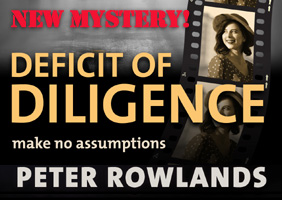Are serial novels cop-outs, or do they represent just as legitimate and valid an art form as stand-alone novels?
When I started writing novels, I vowed to myself that I would never write a series of books about the same characters. It seemed like an admission of defeat. I would only write stand-alone novels. Yet now I have. I’ll be launching my latest novel on my web site in the next few weeks, and it’s a follow-up to my first. Why?
I could sit here and think up lots of artistic reasons for my decision, but if I’m brutally honest, there’s one driving motivation, and it’s much more nakedly practical. I want readers! I judged that since people seemed to like my first novel (and some even asked for a follow-up), I would be much more likely to attract readers to a second book about the same characters than I would to a stand-alone work about new people in an unfamiliar context.
Having taken that decision, I must say I found it a delight to revisit my existing characters. I realised they’d lived on in my head, and now I could bring them back to life on the page as well, and explore them further. But I have to admit I was strongly prompted by all the advice on the web, indicating that e-books in particular benefit in marketing terms when they’re part of a series.
Readable and compelling
So was this a sell-out? Well, according to my own tenets, yes! Yet in practice I would defend my decision. I think (hope!) I’ve succeeded in creating a readable and compelling story with most of the right elements – fast pace, mystery, excitement, strong characters, lively dialogue, and a succession of surprises and reverses: many of the same ingredients, in fact, that you might expect in a stand-alone story. At the same time there are some teasing moral puzzles, and there’s an underlying theme about a challenged relationship. The course of true love doesn’t always run smooth.
Serial dramas are everywhere
The fact is that the world abounds with serials. They’re everywhere. In the world of thriller novels we have Michael Connelly’s Harry Bosch, Lee Child’s Jack Reacher and CJ Box’s Joe Pickett: characters in fantastically successful and popular works. On television, serials are among the most popular dramas: the long-running Silent Witness, DCI Banks, Sherlock. Even in cinema, there’s an increasing emphasis on follow-ups. Look at the recent launch of the new Jason Bourne blockbuster, years after the original series. To the film makers, follow-ups usually represent a safe bet.
But how do you constantly reinvent existing characters?
Here’s the problem. Historically, drama has concerned sets of characters confronting choices, contending with temptation and threat, learning new things about themselves, and ultimately refocusing their lives. Relationships often lie at the heart of the story: love and loss, and learning to live with unexpected outcomes.
But how can the lead characters in ongoing dramas keep on refocusing their lives, keep on striking up new relationships, keep on emerging as wiser people? The answer is that in many respects they can’t. So instead of all this, we end up simply following the ups and downs of their established lives: all very well, but we miss out on the kind of intense personal crisis that may come only once in the average person’s lifetime.
That doesn’t mean serial dramas aren’t valid. Of course they are. I love those TV serials, and I’ve read every Harry Bosch novel that’s been written. But sometimes the writers and developers of these serials are forced to stretch the story lines in order to create the tension that the drama demands. Harry Bosch, for instance, veers from one relationship to another over the years. Nothing wrong with that, but if this propensity is the only way to weave fresh relationships into serial stories, arguably it limits the kind of leading character you can write about.
Stand-alone or soap – a fine line
A fundamental challenge for the serial writer is that of creating a complete work with its own internal dynamic (in other words, with a unique proposition and resolution), while at the same time including the logical and coherent undercurrents of the continuing story. Veer too far in the stand-alone direction and the ongoing elements are sacrificed; veer too far the other way and you can end up with the worst kind of soap.
Another potential problem with serial novels is that the writer may feel exempt from the need to define and refine the attributes of the leading characters in every book; he or she may assume that the reader is already familiar with them, and doesn’t need reminding what they’re like. There’s logic to this, but taking such an approach too far means the individual books can never be regarded as complete works with their own integrity, and will always remain merely parts of a larger whole.
Enough room for both approaches?
I hope my own attempt at a serial follow-up meets many of these objections, and functions effectively as a free-standing work; and if readers agree, I see no reason not to write a third. Yet I can still see the attractions of writing true stand-alone books about people at the crisis point of their lives, forced to rethink many of their existing assumptions, and perhaps embarking on one-off relationships that appear to be enduring. I hope I have the nerve to pursue this approach as well.
Part of the solution, of course, lies with readers. Those who love ongoing stories shouldn’t be denied them, but hopefully there will always be enough readers who are prepared to tackle books about new, unfamiliar characters – and enough writers to create an entire world, with all its characteristics and dynamics contained within the confines of a single book.



